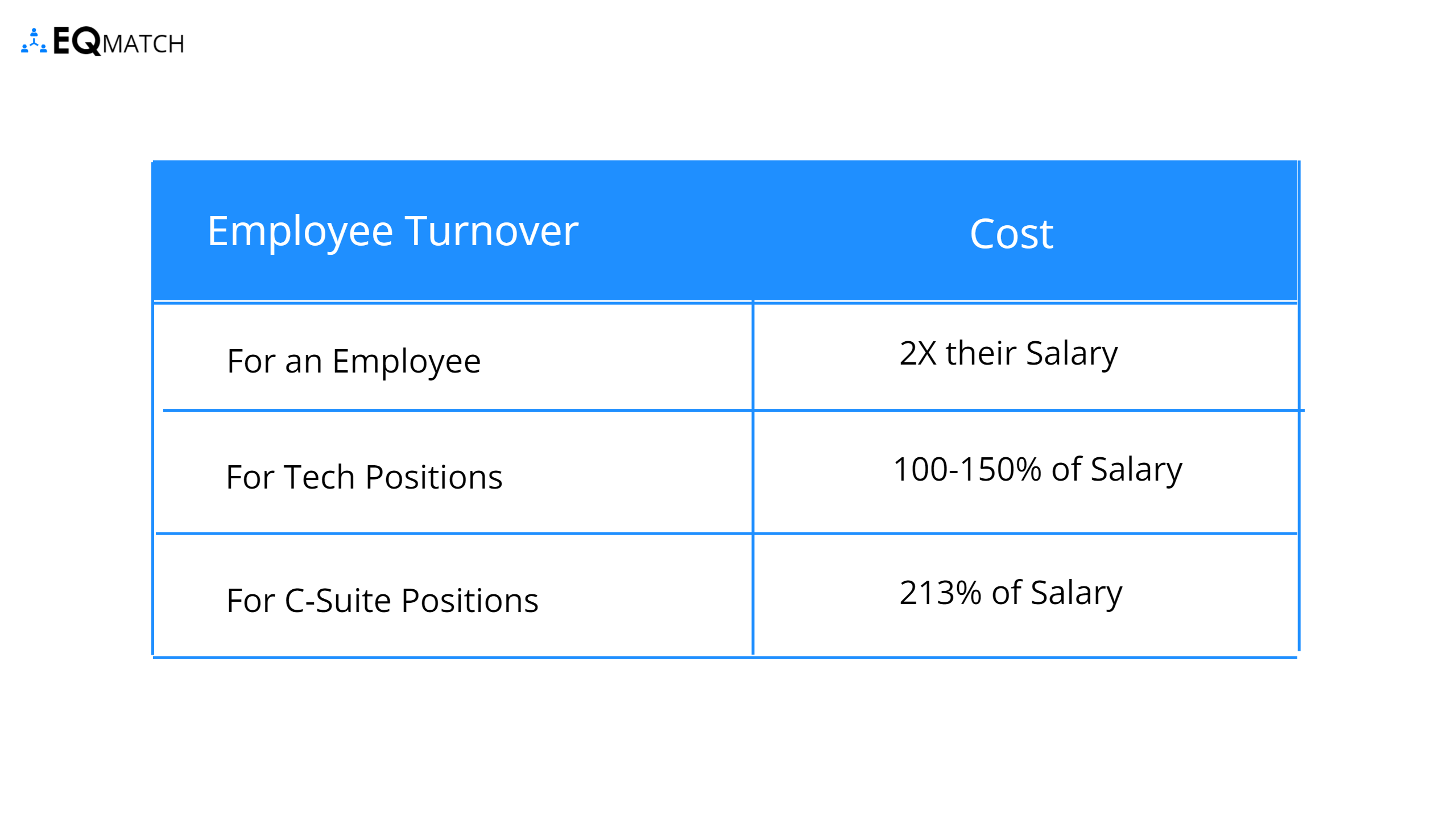Did you know that startups have a 25% employee turnover rate?
And what’s more alarming is that it is almost 2X the national average!
The higher attrition rate coupled with the low tenure rate of employees poses a serious challenge for startups.
Let’s talk about some of the biggest talent acquisition challenges for startups.
Key Talent Acquisition Challenges for Startups
Lower Budgets
Unlike larger companies, startups have smaller budgets for talent acquisition.
In other words, startups might not be able to compete with established businesses in terms of paying salaries and attracting top talent.
In addition to salaries, lower budgets translate into average benefits packages.
Work-Life Balance
Most established businesses are beginning to realize the importance of work-life balance.
In the ideal world, all companies should adhere to this.
However, startups struggle with maintaining a healthy work-life balance.
Often, employees at startups wear multiple hats and work longer hours.

Lack of Human Resource Management
You may already know why human resource management is important for the success of a business, regardless of its size.
Most startups do not even have a dedicated HR employee, let alone a full-fledged HR department.
Without streamlined human resource management, startups struggle to attract and retain employees.
Most startups fail to take advantage of modern recruiting platforms and software for testing emotional intelligence and personality.
They (startups) rely on job postings (LinkedIn) and independent recruiters or staffing agencies.
One of the biggest issues here is that most recruiters do not use recruitment platforms or hr tests for hiring.
As a result, they source candidates for startups solely based on their resumes or LinkedIn profile.
The result is that such candidates struggle to fit in the startup culture, and end up being less productive, or just leave the job in just a few weeks/months.
Startup Employee Turnover Costs
High employee turnover poses several challenges to startups and small businesses.
When an employee quits, the productivity of the team also goes down.
Secondly, turnover can increase recruitment costs.
Employee turnover lowers company morale.
As a result of all these, startups experience a lower revenue, and worst of all, an increased employee turnover.
When a key employee resigns, it can set off a chain reaction called ‘turnover contagion’.
Here is a quick visual to help you understand the financial costs associated with employee turnover.

Since a startup has limited capital, these costs quickly add up and quickly impact the company’s burn rate and overall profitability.
How to address employee turnover and talent acquisition challenges for startups?
Until now, we talked about the challenges startup companies face in terms of talent acquisition and employee turnover.
As I mentioned earlier, employee churn not only costs a startup financially in terms of recruitment and replacement, it impacts the business in several more ways- delayed projects, increased workload, decreased morale, and more.
Let’s now dive into strategic solutions to these issues.
Revamp Recruitment
The employer-employee dynamics have witnessed a huge change in the last few years, especially post-pandemic.
With recruitment becoming more candidate-centric, startups need to revisit their recruitment processes.
They should be willing and open-minded about adjusting their recruiting methodology to create a more streamlined hiring process.
Let’s discuss a real-world scenario here.
A large number of applicants use LinkedIn job search to apply for startup companies.
Startups filter these resumes based on either candidates’ experience/skills, or certain LinkedIn filters (screening questions).
The issue with this approach is that it does not reflect a candidate’s soft skills or emotional intelligence.
Moreover, with most interviews happening remotely (phone/virtual meeting), it is difficult to get a 360-degree view of the candidate’s personality.
How to solve this?
Startups can leverage technology to improve their recruiting processes.
For example, startup companies can leverage emotional intelligence testing and hr tests for hiring.
Startups need to assess which candidates have low emotional intelligence and which exhibit high EQ.
You don’t need to break the bank trying to find a good pre employment testing software or recruitment software for small businesses.
Prioritize & Streamline Communication
Chances are that you run a hybrid team or a remote team.
Communication can take a big hit in such scenarios.
Startup companies need to streamline their communication channels so important messages do not fall through the cracks.
Team Building
I am sure you understand why team building is important.
An all-work-no-play approach might sound good in theory to startup founders.
However, it has all the elements of taking a company to its grave.
From unhappy, frustrated employees to a lack of sense of belonging, a startup culture without team building experiences all these issues and more.
This is why startup companies should proactively invest in team building, so employees can have fun at work and develop a sense of camaraderie and belonging.
Team building games can come in handy in this regard.
If for some reason, it is not possible to organize outdoor team building events, startups can use online games for team building.
Culture
Most startup companies sideline the importance of building a positive culture.
Their mindset is “let’s drive revenue first, and then we shall think about culture”.
And even if they decide to document their organizational culture, it is just a “formal” PowerPoint slide, with little to no “implementation” in the real world.
Leaders at startups need to take a top-down approach to build a positive culture.
A strong startup culture starts with taking time to define your values, practicing what you preach, being inclusive from Day 1, regular evaluation, and choosing empathy and kindness.
Work-life balance
In the perfect world, you do not want to ask your employees to work extra hours or on days off.
However, often, important projects call for that extra effort from employees.
This can translate into working extra hours.
While you cannot 100% avoid this as a startup, you can offer incentives to your employees for working additional hours.
Startup companies can also consider a flexible working model or a remote working model.
This way, employees can work when it suits them, while still adhering to the minimum weekly/monthly hours.
Career Growth
We grow through acquiring and implementing knowledge.
Startup companies should offer learning and advancement opportunities to employees.
Thanks to affordable online learning courses, you do not have to burn a hole in your pocket to offer learning courses to your employees.
Wrapping Up: talent acquisition challenges for startups
Startups should make employee retention a top priority.
A high turnover rate can hurt a startup more than it would impact an established business.
With the right approach, and a willingness to address employee turnover, startup companies can find success.
At EQMatch, we are committed to helping startups improve productivity and reduce turnover.



No responses yet